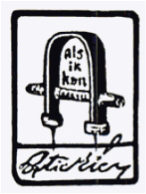Als·ik·kan

From the motto Als Ik Kan, a Dutch phrase roughly meaning "As Best I Can."
It is written on the frame of "Man with a Red Turban" by Jan Van Eyck (in archaic Dutch, written in Greek characters). Later adopted by the Arts and Crafts movement and Gustav Stickley, the motto refers to working with uniqueness: Instead of trying to paint a flawless version of a person, the painter includes (and might highlight) their unique imperfections.
We chose the motto for the farm for two reasons:
1. We are working with what we have and improving it, rather than trying to level everything and build something completely new
2. Dressage is developing each horse into the best that he can become rather then trying to mold him into something he is not.
Add the fact that I started my dressage career riding Dutch-bred horses and my husband's background in architectural engineering and art history, it seemed like the perfect fit for us.
It is written on the frame of "Man with a Red Turban" by Jan Van Eyck (in archaic Dutch, written in Greek characters). Later adopted by the Arts and Crafts movement and Gustav Stickley, the motto refers to working with uniqueness: Instead of trying to paint a flawless version of a person, the painter includes (and might highlight) their unique imperfections.
We chose the motto for the farm for two reasons:
1. We are working with what we have and improving it, rather than trying to level everything and build something completely new
2. Dressage is developing each horse into the best that he can become rather then trying to mold him into something he is not.
Add the fact that I started my dressage career riding Dutch-bred horses and my husband's background in architectural engineering and art history, it seemed like the perfect fit for us.
